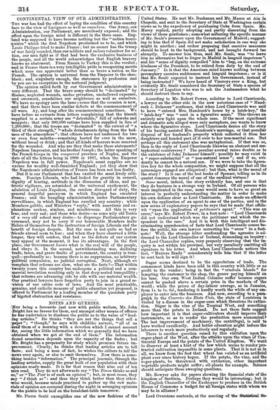The opinion called forth by our Government administration is -very
different. That the brave -army •should be " decimated" by 'disease, neglected wounds, -undue privation, unsheltered exposure, ...and overwork, scandalizes our neighbours as well as ourselves. We have no apology save the lame-excuse that the occasion is new, -and 'that there have been similar defects at the commencement of all wars. Ay, and long after the commencement sometimes. We have before us extracts from letters complaining that the biscuit --supplied to a certain -army are 44 detestable," full of cobwebs and -maggots ; that only 500;000 rations have been supplied in lieu•of '1,200,000; that the troops are " decimated " to the extent of " a third of their strength," "whole detachments dying from the bad- ness of •the atmosphere"; that officers have not undressed for •two --or even four months—remaining booted for 'ever in the •snow, -without bread or drink ; and that all kinds of horrors were reserved for the wounded. And who are they that-make these statements? 'Napoleon Imperator, and his brother Joseph ; the latter speaking of 'the French troops in the conquered province of Naples, and the -date of all the letters being in 1806 or 1807, when the Emperor
• Napoleon was in full power. Napoleon's scant supplies are no excuse for wealthy well-furnished England; yet they show that the Napoleonic 'administration of France has been not less faulty.
But it is our Parliament that has excited the most lively criti- cism. Foreign Liberals, who had looked for gravity in council, 'dignity of bearing, certitude in the discussion of ideas, and pa- :biotic vigilance, are astonished 'at the -universal excitement, the adulation of Louis Napoleon, the random disregard of duty, the -general forgetful paroxysm in which England has emulated France; •and the bungling administration under Parliamentary unrveillance in which England has excelled any country ; while 'Members gabble, and Ministers "' reply," with assertions and ex- planations useless, aimless, and mischievous. All this is very 'true, •and very sad ; and those who desire—as some wily old Tories of a very old school may desire—to disparage Parliamentary go- vernment, may not be sorry if our honourable Members make -Helots of themselves for the instruction of foreign Liberals and the benefit of foreign despots. But the case is not quite so bad as friends abroad seem to fear • and when they have observed a little longer, they will confess, that bad as the defects of our system --may appear at the moment, it has its advantages. In the -first place, our Government knows what is the real will of the people, and obeys it. In the second, notwithstanding war, declining -trade, taxes, and grave faults of government, the country is tran- Auil—profoundly so ; because there is no suppression, no arbitrary political compulsion, no judicial corruption. Next, although we -complain that reforms are slow, -what are the facts?—That within -twenty years this country has undergone a political and a com- -menial revolution resulting only in that deep-seated tranquillity ; -that reforms are advancing side by side with our material wealth. 'Our pautical lawyers have forgotten party to join in a grand re- -vision of vur entire code of laws. And 'the most practicable, -genuine, and catholic measure of public education yet proposed, is offered to Parliament by a leading member of 'the quondam party 'xif bigoted obstruction and resistance.


























 Previous page
Previous page